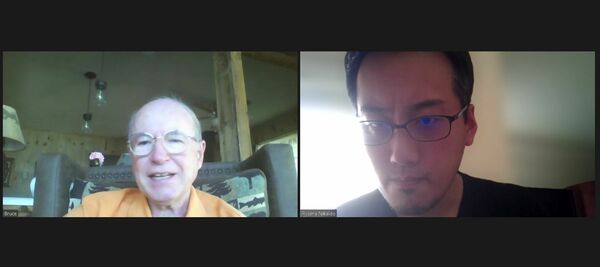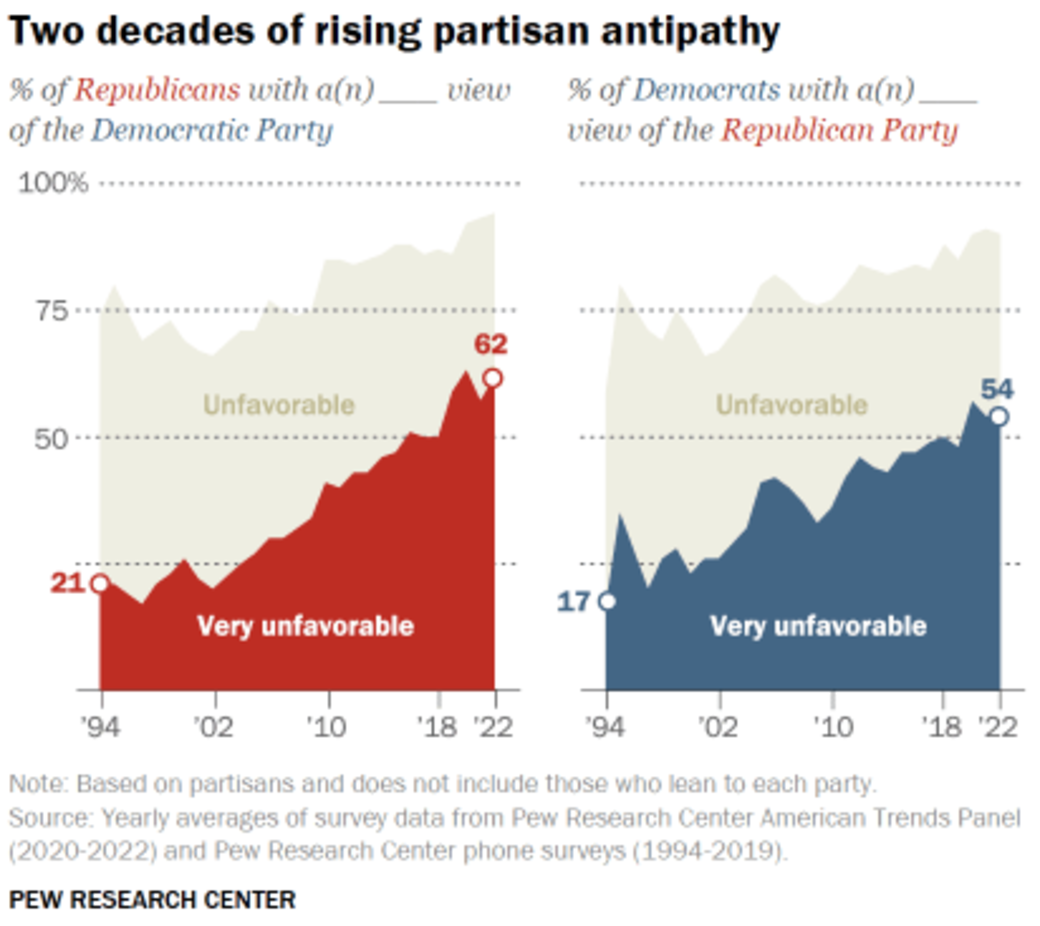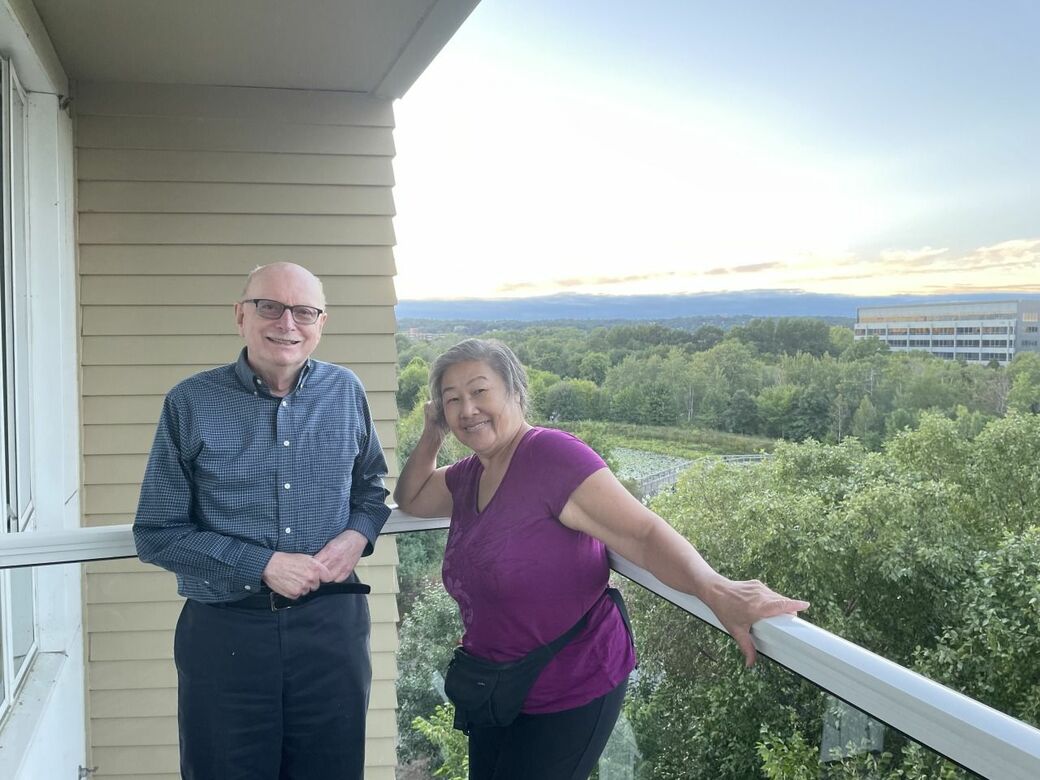
People were spending a leisurely weekend on the Hoboken waterfront ― a New Jersey city known as the hometown of Frank Sinatra, one of America's most iconic singers, which also boasts a view across the river of the skyscrapers of New York City. Contrasting with this idyllic scene, Andrew, 58, began to fume aloud to me about his dissatisfaction with the present state of politics the moment we met at the entrance to the hotel.

He said “Look at the consequences of the massive benefits that the Biden administration has been doling out in the wake of the COVID pandemic. It looks to me like it’s just letting some Americans live off the benefits without having to work.”
Andrew, a self-identified Republican moderate, was born in New York City and grew up in the north New Jersey suburbs. He now runs his own business as a financial IT consultant and is one of those who miss the good old days of American conservatism when “small government” was the goal. That is why he is strongly opposed to the massive economic packages that President Joe Biden has implemented.
His criticism of Biden continued even as we walked into the restaurant and sat down to eat our meal. His anger turned next to Biden's energy policies.
He said, “The Inflation Reduction Act, which is really Biden’s Green New Deal policy in disguise, makes no sense at all when the U.S. could be energy self-sufficient if we simply drilled for more oil like during the Trump Administration.” With the current inflation, in fact, the electric bill for Andrew and his wife's home jumped to $227 per month at one point. The cost of keeping the cars’ fuel tanks filled is also skyrocketing.
His anger peaked when talking about the conflict of values and ideology between conservatives and liberals.
“Since the time of Barack Obama (president from 2009 to 2005), the Democratic Party has been engaged in “identity politics” (an anti-discrimination movement by groups of people who share a particular identity),” he said resentfully. “It's a kind of racial game. Anyone who disagrees with them is immediately called a racist.”
“Biden's spending is having a negative impact on people? How could that be?” The next person to speak to me was Kate, 72, who lives in Philadelphia, Pennsylvania's largest city.
In addition to being a singer and actress, Kate had been working for an organization in New York City that reads and records books for the blind and visually impaired. She is now retired and lives with her husband. Philadelphia's racial makeup is over 40% black, and Pennsylvania is known as a “blue state” with a large Democratic base.

The reason why she supports Biden's “big government” agenda.
“Biden's big-government measures have helped many people in need due to the COVID disaster and have actually led to an improvement in the poverty rate. Some people say that people shouldn't rely on benefits because they can find jobs quickly amid the so-called Great Resignation, but the effects of COVID are still there, especially among families with children who want to work but can't."
"In addition, working in the service industries, such as healthcare and restaurants, is very hard, therefore it is very difficult for people in those industries to find a different job. Do the people who are saying it’s laziness think we should abandon those vulnerable people? Unbelievable.”
Kate will also vote Democrat in the upcoming midterm elections. She said “Biden's age, almost 80, is definitely a concern, but I think he's doing a great job, including the student loan forgiveness. It should be taken for granted that the US, whose economy is built on immigrants, supports the vulnerable.”
Joining Kate's argument is Michael, 84, a former dentist living in Manhattan. Michael, 84, explains the importance of the New Deal policies, and the massive public investment made by Franklin Roosevelt in the 1930s. We met at an Irish pub near Penn Station, and Michael talked about the role of the government, including the history of the United States.

“We must not forget that vulnerable workers, including immigrants, have supported the American economy. The government must provide a safety net for them. Specifically, it is important for the government to help organize labor unions to protect workers, as it did during the New Deal.”
Michael was born and raised in and around New York City, except for a stint as a military doctor in the Air Force in North Dakota. He now works as a guide at museums and art galleries in the city. What concerns him is the unequal relationship between corporations and workers that has become more apparent with the COVID pandemic.
"Look at Amazon", he says. “Despite its enormous size (about $470 billion in terms of annual sales), the company does not protect workers – its warehouses provide poor conditions in which to work. They also try to crush labor unions. That kind of arrogance must not be tolerated. The government should help Amazon’s workers to form a union. Improving the relationship between labor and management is the only way to provide a safety net.”
What has become clear from listening to the voices of both Republican and Democratic supporters is that the conflict in U.S. politics revolves mainly around whether to emphasize the principle of capitalist competition or consideration for the socially vulnerable.
However, even if it is said that consideration for the socially disadvantaged is indispensable, the reality they are facing is harsh.
Bruce, 74, who is a friend of Michael’s but supports the Republican Party, told me in a remote interview: “I was raised and went to school in New York, but I don’t like to visit the downtown area, which has now become a very dangerous place. We see crimes committed not only by nonwhites but also by whites. For us old folks, security is very important.”
Bruce, who worked for local school boards for 36 years and is now retired, chooses to live in Lake George, upstate New York, in the summer and in rural Goochland County, Virginia, in the winter. His reasons for doing so are that “the crime rate in America is out of control. It is because the left-leaning Democrats are destroying our way of life.”

At the heart of his complaint against the Democratic Party is the idea that while social problems such as racial discrimination and widening inequality may be behind the divisions in American society, the top priority for the government should be maintaining public security and order.
The death of a black man in police custody in Minneapolis, Minnesota in May 2020 sparked the Black Lives Matter (BLM) movement. However, Bruce said “In the wake of BLM, radical Democrats are calling for police budget cuts, which is more dangerous than it sounds. Instead, we need to strengthen law enforcement by the police.”
“Only Trump or (Florida Governor) DeSantis will be able to return America to what it needs to be in terms of curbing the current crime wave,” he said, expressing a sense of urgency. Ron DeSantis has been dubbed a "mini Trump." His late September transfer of some 50 immigrants to Martha's Vineyard, Massachusetts, a luxury summer resort, invoked controversy. It is believed to have been a reaction to Biden's permissive immigration policy.
The divide between conservatives and liberals shows no signs of being bridged. Survey data confirm that the division in the U.S. is growing deeper and deeper.
The percentage of Republicans who view the opposing party as “extremely unfavorable” rose from 21% in 1994 to 62% in 2022. Among Democrats, the percentage of those who view the opposing party the same way rose from 17% in 1994 to 54% in 2022.
Comparing between 1971 and 2022, the ideological averages for Democrats and Republicans in the U.S. Senate have also swung to the extremes for both sides. The Senate tends to be more moderate than the House, but even so, the conservatism of Republican members in particular is noticeable.

Immediately after the U.S. Supreme Court's decision in late June to overturn the Roe v. Wade decision, which recognized the right to abortion, there were scenes of heated debate over the life of the fetus and that of the mother.
Professor Yasushi Watanabe of Keio University's Faculty of Environment and Information Studies, who is well versed in U.S. politics and culture, pointed out “Everything is a matter of opinion now, and the two sides are not on the same page in their perception of the current situation regarding anything. The U.S. is a different country depending on which side is looking at it; they are in parallel worlds. There is no doubt that the U.S. today is the most divided the country has been since the Civil War,” he said with an air of concern.

In January 2021, Trump supporters, alleging that the presidential election had been rigged, attacked the Capitol Building. Many observers regard the current situation in the U.S., in which resorting to violence rather than dialogue has become the only available recourse for addressing differences of opinion, as the “eve of a civil war” not seen since the Civil War in the 1860s.
Particularly conspicuous are moves by the Republican Party to stir up division. In Florida, a law called the “Stop WOKE Act” was passed in March this year. This law prohibits “raising awareness (WOKE)” about social issues such as racism, sexism, and the environment. It created the possibility of civil lawsuits being filed against anyone who teaches about the rights of people of color or sexual minorities in corporate training or school education.
A federal court in August temporarily enjoined enforcement of the law, which is said to be intended to maintain the social status of white males.
Even among Democratic supporters, there are those who lament the party's radical lines of argument. This is because while race, sexual orientation, and other minority issues are important, obsessing over them alone is seen as resulting in a more divided nation.
Joseph, 81, of Cambridge, Massachusetts, invited me onto his porch and said “Democrat politicians are now more concerned with social issues (such as sexual minorities and BLM) than they are with the cost of living for the working and middle-class people they have traditionally supported.” Conflicts over those social issues are sometimes referred to as a “culture war.”

“Democratic nominee Hillary Clinton lost the 2016 presidential election because many people thought she represented the interests of Wall Street. Trump was successful in convincing ordinary people that he was a populist. We must remember to reflect on that moment.”
Joseph, a former worker at the Department of Health and Human Services, had been engaged in a program to give grants to states to provide income assistance and social services to the poor. After 27 years with the Department, he now works as a part-time volunteer at the Museum of Fine Arts in Boston.
His concerns about U.S. politics cast on both parties. “The current political situation is like a sports team that is fanatically rooting for a political party for emotional reasons,” he said. “They don't care about the merits of their policies, they care about winning, about beating their opponents.”
Albert, 75, the husband of Kate, the former singer and actress in Philadelphia, who calls his political stance “extreme moderate,” also sees the extreme partisan divide as a problem.
Albert, who studied nuclear engineering as a young man, graduated from Princeton University and earned his Ph.D. from the University of Michigan Graduate School of Engineering. After working for a private power company, he worked independently as a consultant on corporate energy strategy. He now makes his living writing as a playwright critic.
He says that facing the Three Mile Island Nuclear Power Plant accident in 1979 and his aversion to the fate of being tossed to and fro by the winds of politics were one of the things that led him to move toward political centrism.
Albert, who has a distinctive long-haired appearance, says with wide-open eyes “While partisans on both sides of the aisle debate only issues of values, the issue of funding for health care and social security (which is unpopular with the public) is being put off.

This is because so many benefits are promised to recipients and so few taxes are collected from the older generations who are still working. I have eight grandchildren, and I worry about the burden being imposed on the next generation of young people.”
“The current two-party system has reached its limits. As a solution, I would like to see the rise of a third force that is neither Republican nor Democrat. Trump re-election in 2024? I don't really want to talk about it.”
In late August, a research firm YouGov America and the U.K.-based Economist magazine found that more than 60% of Americans expect divisions in their country to widen in the coming years, and more than 40% say a civil war is likely within the next 10 years.
What will be the key to healing those divisions? Professor Kazuhiro Maeshima of Sophia University's Faculty of Global Studies points out that “It is the change in racial composition. If the percentages of Hispanics and Asians increase and racial diversification progresses, the Republican Party may try to capture the votes of these groups. But the right timing would not be after the next presidential elections in 2024 and 2028 but more than a decade from now.”
According to surveys by the Census Bureau and other organizations, in 2045, the nonwhite population will outnumber the white population in the United States — whites will be the minority. Historically, the U.S. has been a predominantly white, male-dominated society with an emphasis on traditional values and Christianity, but for the first time in the nation's history, this structure will reach a turning point.
What will happen in the midst of the ongoing fragmentation and structural change in the United States? It is obvious that mutual distrust among voters has reached an extreme level.
